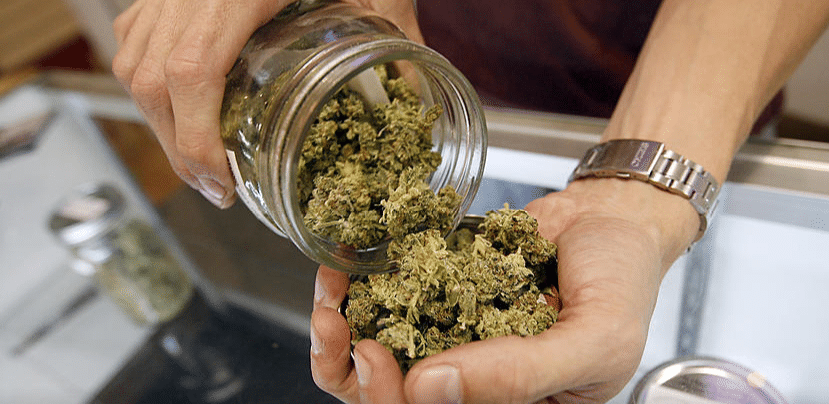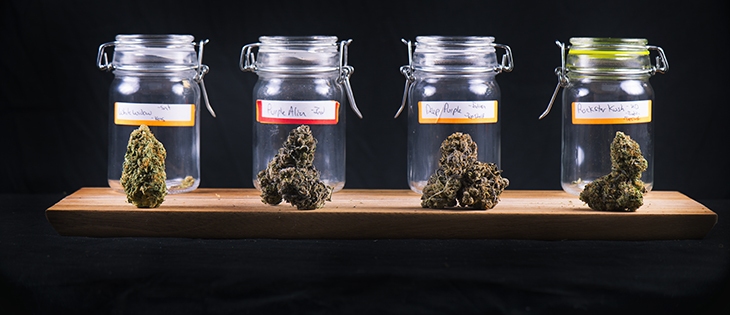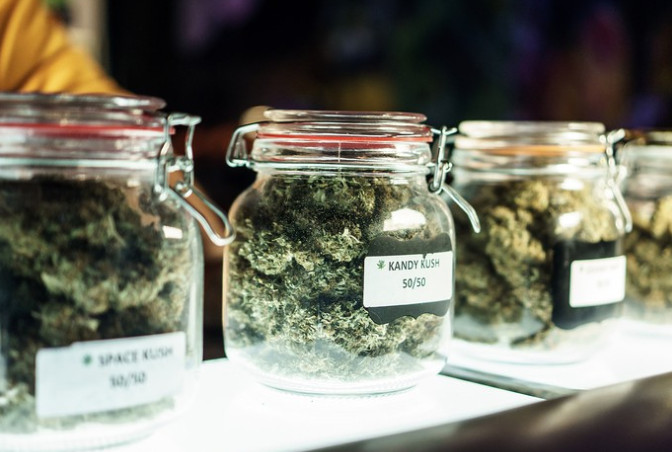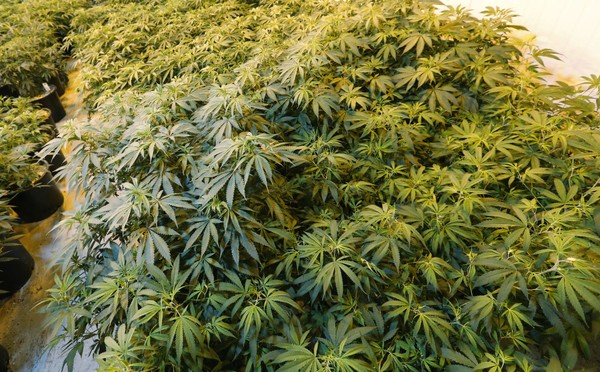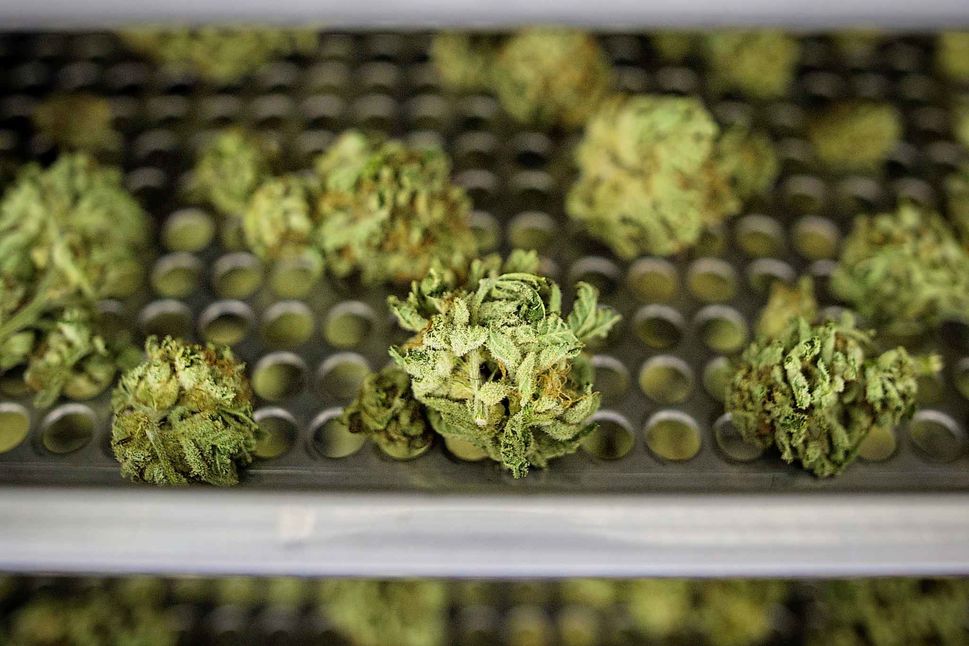Can a 58-year-old former insurance executive build the first national marijuana brand? With these gummies, she just might.
Nancy Whiteman still mourns those candied, spice-dusted almonds. “They were so good. They were so stinking good,” she sighs longingly. And so stinking hard to make–legally.
Because Whiteman, the unlikely co-founder and co-owner of the most successful specialized candy business in Colorado, didn’t stop with the curry powder and sugar and salt. She also dredged those almonds through syrup infused with THC, the active ingredient in marijuana.
After all, that’s what her seven-year-old company, Wana Brands, makes: treats that can get you really, really high. The Boulder-based business, which Whiteman runs with her ex-husband, ended last year as the best-selling purveyor of marijuana-infused edibles in its home state of Colorado, according to industry data firm BDS Analytics.

credit:Jamie Kripke
Whiteman may have begun her legal-pot career rummaging through weed-extraction videos on YouTube and testing recipes in a kitchen that was “one step up from an Easy-Bake oven,” but Walter White she is not. Nor is she even Mary-Louise Parker’s Nancy Botwin, the housewife-dealer of Weeds. A 58-year-old mother of two, Whiteman presents as more sales rep than drug lord: russet hair in a sensible bob, a sly sense of humor tucked beneath a Northeastern reserve, and the professionally tidy business casual of someone who started her career in suits. “Whatever your stereotype might be of somebody in the marijuana business, I’m probably not it,” Whiteman, a former insurance marketing executive, wryly acknowledges. “I think a lot of times people are just surprised.”
Whiteman happened to be in the right place at the right time. Colorado in 2012 became one of the first two states to legalize marijuana for nonmedical (or what’s called recreational or adult) use and is now its biggest U.S. market. Anyone age 21 or older may walk into a dispensary there, show an ID, and buy an ounce of loose “flower” to smoke, or concentrated oil for a vaporizer, or a pot brownie or chocolate bar or ice cream or granola bite, or any of the many other types of food that are infused with THC.
Wana–an abbreviation of marijuana, and the brand name for the Mountain High Products parent company–currently sells about a dozen edible products in both medical and recreational varieties. What put Whiteman on the map last year, helping her company earn $8.4 million in revenue, is Wana’s sour gummies: neon-bright, sugar-dipped, vegan cubes of pectin and corn syrup and fruit flavor and 10 milligrams of THC-infused oil per bite. They look like fancy square gumdrops, taste like gourmet Sour Patch Kids, and can pack the wallop of a powerful sleeping pill that simultaneously stokes every lingering anxiety about your email backlog. (In this reporter’s experience, at least.)
Whiteman’s pragmatism has enabled her to thrive in an industry that is still illegal federally, and very much a minefield. Routine business tasks like keeping a bank account, setting up social media promotions, and shipping products around the country to the 28 other states (plus D.C.) where cannabis is legal to varying degrees can be difficult to impossible. State regulations are an ever-shifting complication, affecting everything from product packaging (which in Colorado must be childproof) to labeling (which now includes THC warnings stamped into each gummy or other piece of weed-laced food) and even language (since October, Whiteman can’t legally call her sugary products “candy”).
Take those delicious weed-infused, curry-dusted almonds Whiteman still misses. “There was no way to make sure that each dosage” of spice mix was evenly distributed across every almond, says Whiteman, leading her to yank one of her favorite Wana products from the shelves. (She would’ve had to anyway: In 2014, Colorado started requiring edibles makers to ensure that THC was consistently spread across their products.)

CREDIT: Jamie Kripke
Even with the industry’s many constraints, it is booming and has drawn entrepreneurs of all stripes trying to get in on the ground floor. The Colorado market alone accounted for more than $1 billion in sales in 2016, or almost a sixth of national revenue, according to Arcview. The investor group and research firm projects that the North American marijuana market will exceed $22 billion in revenue by 2021. According to the Brewers Association, that’s about the current size of the craft-beer industry, another entrepreneur-driven legal-vice market. Investors last year poured $205 million into legal-cannabis startups, according to CB Insights, including those that grow the plants, dispensaries that sell its various incarnations, and consumer-products makers that turn it into food–not to mention all of the supporting software providers and payment processors and branding specialists and other auxiliary businesses that have sprung up to support this industry just starting to take shape.
Now Wana is one of several fast-growing startups trying to establish a national presence. Whiteman and her ex-husband/co-founder, John, are jockeying with a crowd of other Colorado edibles entrepreneurs who have their own product hits, including infused-drinks producer Dixie Brands; chocolate-taffy maker Cheeba Chews; chocolate-bar maker Incredibles, and rival gummy company Americanna. Someday–in years or decades–one of these companies could become the Mars candy or Sam Adams of edibles, on the shelves of every Target and 7-Eleven.
But like everything else in the cannabis business, the road to becoming a national consumer brand is exponentially more complicated. Wana can’t legally ship anything that contains marijuana beyond the Colorado border, so it is setting up licensing and distribution partnerships in every state it wants to expand to. As a licenser, the young brand has to figure out how to control the quality of its product and its reputation as it hands it over to partners in different states, each of which has its own set of shifting regulatory nuances and varying levels of industry maturity. All of this is happening under the broader threat of President Trump and his historically antiweed attorney general, who at any moment might decide to try to block all legal marijuana sales, which would throw Wana’s business into a tailspin.

CREDIT: Jamie Kripke
Trying to build a business in this environment requires an extraordinary tolerance for uncertainty. For Whiteman, that means constant, relentless improvisation. “This is such a green-pasture, blue- ocean industry,” Whiteman, ever the marketing executive, says. “We’re all making it up as we go along.”
If there’s a gateway drug Whiteman has her eye on, it’s chardonnay. “I call it the white-wine crowd,” she says of the edibles customer base. Think parents of teenagers, decades past their own college days, kicking back at a Saturday dinner party with a bite instead of a glass: “People who are not looking to get completely wasted, who just want to relax a little bit.”
Wana is not the coolest marijuana brand, nor does it want to be. Its gummies come wrapped in basic, design-lite packaging. Its headquarters are spread across a few cluttered warehouses at the back of an anonymous office park. The yellowed facilities seem like a fairly sad venue for a holiday party, but that’s where the Whitemans celebrated with their 90 employees in December–without putting any of Wana’s signature treats out on the refreshment table.
That’s just one of the weird regulatory quirks of Colorado’s legal-marijuana business: Public consumption of the products is still outlawed, even when, as in this case, the public is a crowd of people who legally make and sell the products on their own premises. “We won’t do something if it’s too much of a risk,” Whiteman says, carefully steering her snow-dirty Camry Hybrid through the gray streets of suburban Boulder. “We’re conservative that way.”
What Whiteman and her company are betting on is that by being boring–and consistent and mainstream, and hopefully beloved by older people with a lot of disposable income and a distrust of bongs and their pervasive smoke and the post-adolescent stoner culture they represent–she can vault her company into mainstream consumer-product respectability.
“When we started out, it was very much about a young male demographic, who wanted really high-potency products. There was a lot of cheesy, hippie stuff,” Whiteman recalls. “My feeling from the beginning is, that’s not who we want to be.”

credit:Jamie Kripke
What exactly Wana was going to be was difficult to determine, at first. Whiteman is a professional magpie, rather than a product visionary–someone who describes herself as opportunistic. “I’ve always known generally where I want to go, but not the specifics of how to get there,” she says.
And at first, not even that. After growing up in the Westchester suburbs of New York City and going to business school in Massachusetts, Whiteman stumbled into her insurance career with a job at Paul Revere Life Insurance. She always felt too quirky for corporate America, but somehow kept getting promoted. Family ties brought Nancy and John, then her husband, to Boulder in 1996, where she decided to start her own business, a marketing consultancy. But consulting, she soon realized, can be hard to scale: “Clients were buying my services, and I couldn’t clone myself.”
Consumer products would–and cannabis, suddenly, was booming in Colorado. It had been legal for medical purposes since 2000; by the end of that decade, loosening federal drug-enforcement policies had contributed to a surge in customers, and in dispensaries selling to them. Even before the state’s legalized recreational marijuana laws went into effect in 2014, dispensaries needed more products to meet the growing demand, creating a huge opening for local entrepreneurs interested in what was initially a small-batch business.
Whiteman, who says she’s done the requisite college-era experimentation with weed, began thinking about the stuff via her children. Or, at least, their social circle: One of her daughters had a friend whose father was trying his hand at an infused-soda business. He’d already acquired a commercial kitchen and the legal license to work with marijuana products, and he knew how to source the raw plant “trim” that the Whitemans would need to infuse their products. In 2010, Nancy and John–at the time, an urban planning consultant–decided to work with him and started their own company as a side project.
The couple invested some of their savings in their friend’s kitchen and spent their free time learning about edibles. But those early days were tumultuous. Within six months, the Whitemans decided to go out on their own. Nancy and John were also trying to get their professional partnership off the ground while figuring out the end of their personal one. “Starting a business when we did, given where our marriage was at the time, was a brave act, many people thought,” Nancy says, choosing her words carefully. “But there was the fun factor. We’re both motivated by trying new things, and we thought, ‘This would be so cool. Why not just try it?'”
She and John divorced in 2011, but found their footing as business partners. John would oversee Wana’s operations and logistics, while Nancy would handle sales, finance, marketing, and business development, and be the public face of the company.

CREDIT: Jamie Kripke
They eventually hired two cooks to help them develop their recipes and figure out how to make the THC-infused products just as delicious as the noninfused prototypes. “If you tried some of the early edibles on the market, they tasted terrible–very hashy,” Whiteman recalls. “We learned that there were certain flavors that camouflaged that taste, like chocolate and orange.” They developed a bakery’s worth of indulgences, including weed-laced peanut-butter crisped-rice treats, cannabis-chocolate chews, gluten-free pot brownies, and chocolate cookies with an infused mint-cream filling.
Early distribution was relatively easy, if time-consuming and small-scale: Whiteman would cold-call local dispensaries, asking what was popular and what they needed, and would drop off samples for the owners and “budtenders.” If the people selling the stuff liked it, they’d recommend it to customers, and order more from Wana. Or they might ask Whiteman for something slightly different. “It was all live research,” she says. “We tried things. We saw how people reacted. We made changes on the fly.”
But there was a fundamental flaw with many of their products–they’d get stale awaiting shipment around the state. So within a few years, the Whitemans started to seriously investigate candy. Unlike baked goods, candy is shelf-stable and easy to standardize. Gummies, specifically, were also gaining popularity both outside of marijuana circles (as a delivery vehicle for traditional multivitamins) and within: Denver-based edibles maker EdiPure had dominated the Colorado scene with its sour gummy bears. But EdiPure’s production process–involving buying off-the-shelf candy and adding THC–soon ran afoul of Colorado regulators, who eventually banned edibles makers from using premade food. There were other problems: It turned out that EdiPure also used some weed that had been sprayed with potentially dangerous and illegal pesticides. By the end of 2015, the company had suffered four recalls, and had to pull about 63,000 products from shelves. (The state later released a portion of what had been recalled.)
The Whitemans saw their opening. They decided they’d put their muscle behind developing a better “homemade, artisan-level gummy.” Wana spent some $30,000 refining its sour gummy recipe, including lab testing and consulting with a man Whiteman calls the country’s foremost “gummy expert”–who opened their conversation with a near-theological discourse on “the pectin world versus the gelatin world,” and how THC-infused oil would interact with each. (Whiteman was already firmly pro-pectin: “We all preferred the texture over gelatin, which is rubbery,” she says. “And it’s vegan. Of course, being in Boulder”–a health-food mecca–“we had that in mind.”)
By last July, six months after the fourth EdiPure recall, Wana had replaced its predecessor as the top edibles seller in Colorado. When EdiPure was struggling, “Wana really started gaining momentum,” says Elisabeth Stahura, co-founder of BDS Analytics.
Today, you can walk into more than 450 of the state’s 500 dispensaries and, for around $20, buy an unimposing canister of Wana sour gummies, filled with 10 tangy, 10-milligram doses of THC. “These are kind of intense,” one cheerful budtender at a downtown Denver dispensary confided. “I save them for when I’m at home and can have some alone time.” But intensity is in the eye (and body chemistry) of the user; another regular Wana customer says she usually pops a gummy right before working out.
At Denver-based dispensary chain Medicine Man, which did $18 million in sales last year, Wana canisters are prominently displayed on the shelves. “These are by far the number-one edible, because of the flavor profile,” says co-founder and president Sally Vander Veer, giving Whiteman–now a friend–the industry’s ultimate compliment: “They don’t taste like weed.”
Bearded men are a problem for Nancy Whiteman today: The sprouting, unchecked chin follicles of Colorado’s hipsters are suddenly, glaringly expensive.
In the interest of making professional, fully regulated edibles, Wana has hired a number of those unshaven young men to work in its industrial kitchens. And while going over her fourth-quarter books on this chilly afternoon in February, Whiteman stops short at the line-item expense for beard nets. “I need to employ more clean-shaven guys,” she mutters, low and flat and waiting for the laugh.
It’s not entirely a joke. Sure, Whiteman shouldn’t really have time to worry about a few extra kitchen supplies. But her willingness to sweat every detail is one of the secrets to Wana’s success. The marijuana industry still often looks more stoner bro than compliance wonk–but now that it’s legal and so highly regulated, it desperately needs more adults in the room. Suddenly, there’s demand for talent that cares less about getting high and more about making sure that every piece of packaging adheres to the latest state rules or city edicts. Now seasoned professionals who have years of experience in other fields–many of them women–see in legal marijuana the opportunity to get in early and, well, lean in. (See “The Ladies of Legal Weed.”) “The biggest problem the industry has is human capital,” says Jane West, a founder of women-in-cannabis networking group Women Grow (and the pre-gy).
For the past seven years, Whiteman has been working to do just that, hoping to one day become the country’s first national edibles brand. But the challenges are endless. Because marijuana businesses can’t legally ship the plants–or any products made with them–across state lines, any company that wants to expand beyond its home state has to either start new operations from the ground up in every locale it wants to be in, or license its recipes and its brand name to partners, in exchange for a cut of sales. Some of Wana’s competitors have tried the ground-up approach, setting up new operations at a reported rough cost of $2 million per state. Wana, which is in three states and plans to get into at least three more this year, is going the licensing route, which is cheaper, but requires more handholding.
Each new state that Wana enters has its own thicket of red tape, and expansion is a stop-and-start game: In Oregon, for example, Wana and its licensing partner had its products on the shelves of more than 160 dispensaries by the end of last year. Then, the state decided that a different regulator should oversee the industry–forcing dispensaries and product manufacturers to redo their legal paperwork and their quality-testing procedures, and effectively halting most sales of marijuana products for weeks. “This is the kind of thing that just adds a lot of complexity to these out-of-state situations. It’s just very messy,” Whiteman says. “I don’t know whether we were geniuses or idiots for deciding to launch in Oregon when we did. Depends on the day.”
It’s a land grab among Wana and its competitors, all racing to gain loyal customers outside of their home territory to become a national consumer brand. As Wana pushes into Nevada and Oregon and possibly soon Arizona, Whiteman’s hoping to build a reputation for “professional, great products–we’re safe, you can count on us, we’re consistent.” Establish that sort of brand in every state Wana can, her thinking goes, and when marijuana is finally legal on the federal level, the floodgates will open.
But Wana’s entire industry faces an unexpected, if deeply uncertain, federal threat. Since Donald Trump was elected president–on the same day that eight more states decided to legalize or expand legal marijuana–entrepreneurs have swung between blithe optimism and near panic. Republicans often invoke states’ rights, and doing anything to limit the legal-cannabis industry’s growth would hurt business owners and the estimated 100,000-plus jobs they have created. But Trump is unpredictable; in late winter, Attorney General Jeff Sessions and White House spokesman Sean Spicer made comments about cracking down on the legal-weed industry by enforcing federal prohibitions despite state laws legalizing it.
In Wana’s best-case (if most unlikely) scenario, Trump will support full federal legalization; worst case, he’ll try to block both medical and adult-use sales. As of press time, Whiteman and other legal-marijuana entrepreneurs said they were bracing for something in between, with the medical-use market being allowed to remain unchanged, while recreational marijuana is banned. “It’s obviously something we take seriously and are watching closely, but I don’t think panic is called for at this point in time,” Whiteman said in mid-March. “Most people I’m talking to are watching it, but they’re moving forward.”
Edibles are particularly vulnerable on both the state and federal levels, because what makes them so great–they are the most discreet, odorless way to get high–is also what makes them dangerous: They can easily be mistaken for regular food. “For most people who have had a bad experience with cannabis, it’s because of edibles,” says Stahura, the BDS analyst. Some legal marijuana states have already banned them outright; Colorado responded to these concerns by mandating childproof packaging and stamps on every individual unit of marijuana-infused food. Whiteman claims to welcome more regulation–particularly national rules–citing the typical pro-legalization pitch. “People are going to continue to make edibles and use them. The scary and unsafe part comes from people making them at home, not testing them,” she says.
Being a leader of the pack in the early days of a new industry doesn’t mean there’s any guarantee Wana will remain there. As it saw with its predecessor, EdiPure, these young companies are fragile. Competition for national success could come from unexpected places, like California: The huge, so-far medical-only state will start allowing recreational sales next year.
So Wana is trying to do everything it can to adapt and mature, quickly. It has created a system to send food scientists and quality-assurance personnel to its partners’ facilities to ensure that the out-of-state versions of Wana gummies have the same tangy sweetness and legal THC ratio. Product development has led to hard candies called Jewels, a new version of one of Wana’s first products, as well as extended-release capsules. Whiteman is also exploring microdose lozenges, with smaller amounts of THC per item.
While John oversees the day-to-day production, most of Nancy’s time is spent out of the kitchen. This week alone, she’s taking a day trip to Arizona, trying to sign up another licensing partner. In coming days, she’ll meet with her accountant to discuss the possibility of transitioning Wana from an LLC to a C-corp. Soon she could be traveling to Maryland and Massachusetts and Illinois and Pennsylvania, discussing more licensing deals and helping her new partners set up operations.
In short, Whiteman will continue to do everything she can to make her sugary, weed-infused candies as legitimate and compliant and regulated and boring as possible–while barely taking a moment to kick back and sample the fruits of her labor. “I’m such a lightweight when it comes to edibles,” she admits. “I’m very busy–and I have to focus.”




